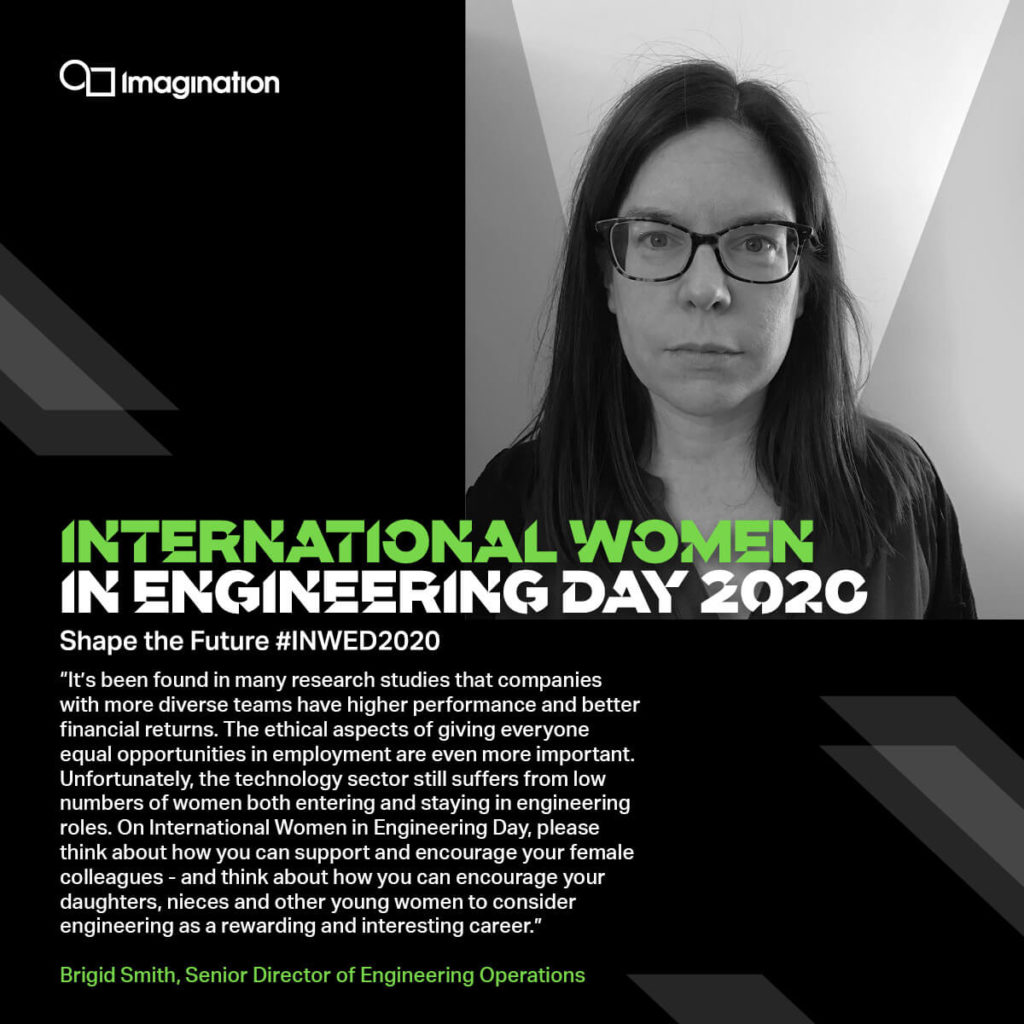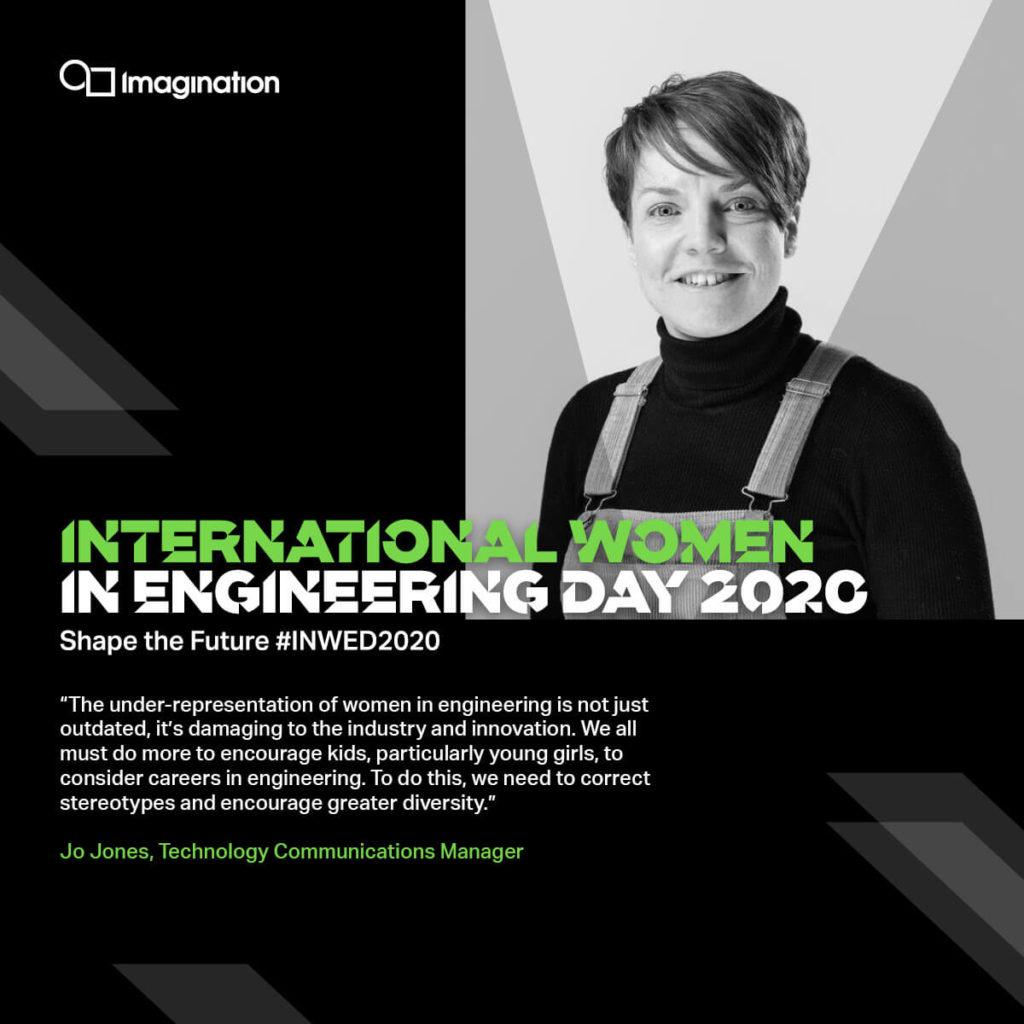- 23 June 2020
- Jo Jones
Research by the Women in Engineering Society (WES) concludes that women make up just 12.3% of all engineers in the UK, and only one in five of jobs are held by women in the wider engineering sector as a whole. When you read those numbers, it’s a bit disheartening and perplexing – why are the numbers still so low? You would hope that in today’s world it would be more balanced and yet it’s not.
When you think of engineers, it is not the likes of Emily Warren Roebling, Victoria Alexandrina Drummond MBE, Edith Clarke, or Beatrice Shilling (OBE Ph.D. MSc CEng) that get mentioned. These women all made significant contributions to engineering in the fields of aerospace, electronics, marine engineering, and construction, and yet they are often forgotten entirely in discussions.
It got me thinking, what was it that inspired these women to enter an industry that was perceived to be for men; and have things changed in 2020?

The women in my life
The obvious place for me to explore this question was to talk to some of the women in my life. Outside of work, I don’t know any female engineers and so I wanted to understand if my female friends and family members had a made a conscious or unconscious decision not to have careers in engineering.
The first person I asked was my mum. She’s in her late 60s and worked for a bank for 11 years before coming a stay-at-home mum. Her school offered career advice and she was destined for a career in hotel management and catering; however, the death of her father at 18 significantly changed her plans.
“When I was at school, engineering was for boys and men. I was always interested in cars because of my dad and I spent hours with him as a child, learning about our car and how it worked. It’s ironic that I went on to marry a mechanic, but engineering was never an option for me.”
“Women didn’t have careers like the men, and we weren’t encouraged to – I can’t think of any of my school friends that did. You went into the workplace until you had children. It was just how it was. Girls of my generation became sectaries, nurses, and teachers. There was a ceiling and engineering was on the other side.”
The next person I spoke to is my friend Rachel who is in her mid-30s and is a degree educated primary school teacher.
She came into teaching by accident while at school, she was unsure about what she wanted to do. Teaching was suggested and fitted with her skillset and from my observations, it’s a career at which she has thrived, as she’s now a deputy head. For her, a career in engineering wasn’t on the radar.
Finally, I spoke to my goddaughter Maisie who is 8 years old. She is just at the start of her education and so I wondered if things might be different for her and her generation. I asked her what she wants to be when she grows up and her response was… a party planner!
I then asked her if she would like to design aeroplanes or smartphones and she said, “no, that would be really boring.” We chatted about it a bit more and she then said that she thought designing things to do what she wanted, whether it was a phone, a toy or a plane would be interesting, but she just thought it would be boring. I also asked her if she thought that some careers were just for men or women, and she said no and that she believes she can do any job she wants when she’s older.
The women at work
When speaking to colleagues, Anna Hedley, Senior Director of Applications Engineering, told me that for her, there was no forethought or lifelong plan to be an engineer or work in an industry in which she would be a minority. It was more the case that when she was at school, she picked the subjects that she enjoyed the most, and when she selected her A-Level subjects – physics, maths and religious studies – she had no idea what she wanted to do as a career. This is something I can completely understand because it was the same for me.
Anna added; “Whilst doing A-Levels I realised I liked the parts of physics and maths that I could see a use for rather than it just being theoretical. We did quite a few different modules and one of them included a small amount of electronics and logic gates. I really enjoyed it and so decided to do electronic and electrical engineering. I looked for courses where I didn’t have to specialise until later in the course once I’d realised what all the bits were and whether I enjoyed them or not.
“University was the first time I met any negativity to my choice. My physics teacher tried to steer me away from engineering and to do pure physics instead so that if I didn’t enjoy it as much as I thought, I could become a teacher. The careers advisor didn’t even have engineer on her list of possible careers to talk to pupils about. Thankfully, my parents encouraged me to do what I wanted to do and if it didn’t work out, to cross that bridge when I got to it; not to pick a subject with failure in mind. It didn’t occur to me to be put off by being outnumbered. I’ve got three brothers and no sisters so I was used to being outnumbered.”
Brigid Smith, Senior Director of Engineering Operations, studied maths, further maths, physics, and chemistry. When she did her A-Level and physics, she said that she was very much in a minority, which could be difficult sometimes.
“I was advised at school that if you were bright you should be a lawyer, an accountant, or a doctor – no one ever mentioned engineering to me. So, I went to university to study medicine and found that it was all learning by heart, which I’m terrible at. I didn’t enjoy it and looked around for something that played to my strengths and what I’d enjoyed at school and ended up changing course to do electronic engineering. Though I was a bit worried about getting it wrong again, so I did take physics as a side option in my first year of engineering and really enjoyed that too. By the time I was a year older being in a minority mattered less to me, and there were always a few other girls in the class. I’ve never looked back.”

One thing that I’ve become aware of from talking to the women of Imagination, is that often they have a parent that either works in engineering or has a love of engineering or technology – it’s mentioned in my post, Women of Imagination – and it makes me wonder if a lot of school kids, particularly girls, just haven’t been made aware of engineering as a career choice, and as such, aren’t making informed decisions about their futures.
Looking to the future of engineering
The feedback and insights that have been shared with me for this post are more qualitative than quantitative, but it gives me hope that things are changing. The fact that compared to my Mum, Maisie knows she can do anything she wants career-wise makes me so happy. Gender should not limit someone’s choices, career, or anything else.
Maisie’s answers suggest to me that what we need to be doing more of is breaking down the stereotypes and assumptions that are made about careers in engineering and the other STEM subjects. This was the focus of another post that I wrote, Putting Imagination into Engineering, which champions the fact that working in engineering is challenging and filled with collaboration and problem solving – the opposite of what many think. This was a big driving force in the creation of Imagination’s school STEM outreach programme, where we go into local schools and deliver a session on programming and robots.

I also think that parents have a really important role to play in breaking down stereotypes. Anna’s parents sound very supportive of her choices and passions, as I’m sure Brigid’s were. Parents need to be sure their kids are aware of all the career options open to them. Today, we can be anything we want to be and so it’s important to have those conversations. It’s also why WISE created 'My Skills My Life', an interactive resource to help girls find rewarding careers in science, technology, engineering, and maths (STEM).
When talking to Rachel about how schools are addressing career gender biases, she said that in the last few years she has noticed a real change in children’s career aspirations and that teachers are challenging children to think more “outside the box”. At her school, they make sure they have copies of The Daring Book for Girls close to hand to support conversations and when teaching STEM subjects, they actively highlight examples of women within the industries.
I do believe things are changing. It is a bit slow for my liking, but it is moving in the right direction. We’ve just got to make sure we keep pushing, challenging the stereotypes, and encouraging future generations of young women to think about choosing a career that they will enjoy and at which they will thrive.






